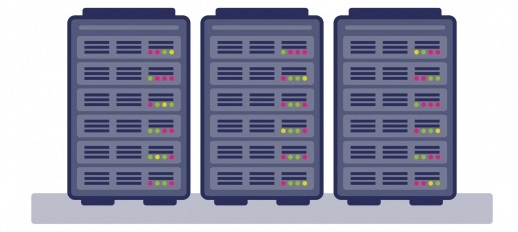
A Beginner’s Guide to Website Hosting & Its Different Types
In modern world marketing and branding, hosting a website is the very initial step for boosting your goods and services. For getting a high rank on social media marketing can only help you when you have a website or a value blog to gain more and more audiences in this digital world.
You need web hosting services to construct your website that will allow you to publish your website or web page live on the web. There are various types of web hosting services available at present that offer different advantages and resources according to your business requirements.
There are multiple types of web hosting, so it’s difficult for a beginner to sort out which one is right. We will therefore look into different types of web hosting to assist the beginners so that you can overcome your concerns and select one out of them according to your business needs.
But before we start let’s understand what web hosting is?
What is Web Hosting?
Web hosting is a medium that enables a website or web page to be published on the internet by businesses. These services are offered by web hosting companies for websites to be accessed on the internet.
On special computers called servers, these websites are stored or hosted. In short, web hosting is a space where everyone can store their websites. For instance, your warehouse is the space where all of your products are stored. Here, your warehouse is a web host. In web hosting, you can store your data, files, documents, videos, etc.
Web hosting providers give you storage where you can store your website through the internet and other individuals can browse your data or files on your web page.
Why do we require web hosting services?
Whenever someone on the internet finds your website by reaching your domain, he typically gets driven to your website. You can build and design your website on your platform as well, but you require a hosting server for that. It can not, otherwise, be viewed by anybody.
A full-fledged server can also be owned and run from your residence, but the only issue is that it is costly to invest in this server and not everybody can afford it. You would need a powerful system with a high-end processor, plenty of RAM, and a Linux or Windows operating system to set up a server. To control and maintain the server, you require to have technical skills as well.
This is the major reason why most organizations choose to get web hosting services that are packed with the requisite infrastructure, such as top-notch Internet access, hack protection, and effective backup so that your website is available to your users most of the time.
Different Types of Webhosting
Free Web Hosting:
Free Web Hosting is an unpaid web hosting service. There are several web hosts to assist an individual who wishes to build their websites like WordPress and Blogger with subdomains.
There are services providing free web hosting, and the domain name of these web hosts like blogspot.com or wordpress.com is given to your website. You need to purchase the service of paid web hosting if you are not willing to use these sites’ domain names.
Shared Web Hosting:
Shared Web Hosting is also considered as entry-level web hosting, as very little technical understanding is needed. n this hosting, multiple websites are placed on a common server with your site.
Typically, the same set of server infrastructure usually called a data center is shared by all websites or domains. The cost is extremely low for shared hosting, for this reason only certain websites are hosted on this server that receives reasonable levels of traffic.
Shared hosting has few drawbacks, which include its insufficient capacity to manage a high volume of traffic and no root access. As other websites are hosted too on the same server, the output of your website can disrupt.
Virtual Private Server:
A single server is divided into multiple virtual servers in VPS hosting, so it is somehow equivalent to shared hosting. Each website is placed on their dedicated server here, but in particular, other users also share the server with them.
The user gets a secure hosting environment with exposure to control their virtual space. Those who tend to have more control over the server, but do not want to spend in a dedicated server, VPS hosting is effective.
On similar servers with other websites, you may notice some obstacles such as site affection and limited capacity to handle high-end traffic.
Dedicated Server Hosting:
Dedicated server hosting is an overall hosting plan in which you get the complete authority to control your server. There are numerous advantages that you will get from hosting this dedicated server.
Initially, no need to share the resources of your server with others. Server configuration, services, and administration of the server will be under your control. You have the authority to host multiple websites on the server. This hosting type offer control and managing resources of the server is mostly preferred by small and mid-level businesses.
Hosting a dedicated server not only enhances your website performance but at the same time can handle lots of requests in the fastest period of time easily.
Cloud Hosting:
Cloud hosting enables you to manage high-end traffic with unlimited capacity. It is also known as Grid hosting. A server group is used rather than using a single server for hosting a website. This group of server ]is known as the Cloud. It allows multiple computers to step together and manage any website’s bulk traffic.
If a single server is hindered for any reason, in this case, tasks on that server can be easily transmitted to another server, and your site continues to perform the same way and this is the main benefit of hosting on the cloud.
Collocated Hosting:
In this hosting, the hardware that is used for hosting your website is purchased by you as per your needs. Thereafter, you deliver the hardware to the hosting company, who installs the server and allows you to access the server inside the data center.
Typically, this hosting service is preferred by websites that want to run the custom hardware so that you have total control over the configuration of both hardware and software to operate your website.
Reseller Web Hosting:
This web hosting is suitable for those who want to resell web hosting to other. With this web hosting, the best benefit you can get is that users will have complete control over their hosting accounts for operating with an admin control panel.
You can also build and manage your hosting plan and handle all the hosting elements that are relevant.
Clustered Web Hosting:
Cloud hosting is often mixed up with Cluster web hosting, although the two vary slightly. Cloud hosting is distributed over a wide area, while cluster hosting is for a smaller region.
Or else, when one server crashes, cluster web hosting also enables you to run on other servers. This server is costly to purchase, as cloud hosting can withstand websites with a global reach that gains high traffic and so can this hosting. You can conveniently move the load from one to another server at the time of your website maintenance.
Self Service Web Hosting:
Web hosting of self-service relies entirely on your own. This super advanced web hosting carries that your server is rented out for storage. Only you are responsible for the hardware, system administrator, backups, resources, and bandwidth.
Managed WordPress Web Hosting:
This hosting of Managed WordPress is for WordPress users only. In this web service, instead of using Plesk, cPanel, etc., the host handles all the operations. With the help of the WordPress dashboard, you can monitor and manage your site’s settings.
Those who aren’t in a comfortable environment to manage the technicalities that arrive with web hosting, this plan is appropriate for them.
Conclusion:
So, here are ten different types of web hosting plans, and now it’s up to you which service is the right match for your business strategy. This can vary from person to person. First of all, you need to make a checklist of your needs and then make your ultimate decision to opt for any of them. For any Tally on cloud detail visit Tally-on-cloud.com.
Read other related blogs:
–5 reasons why a business should move to Private Cloud Hosting


